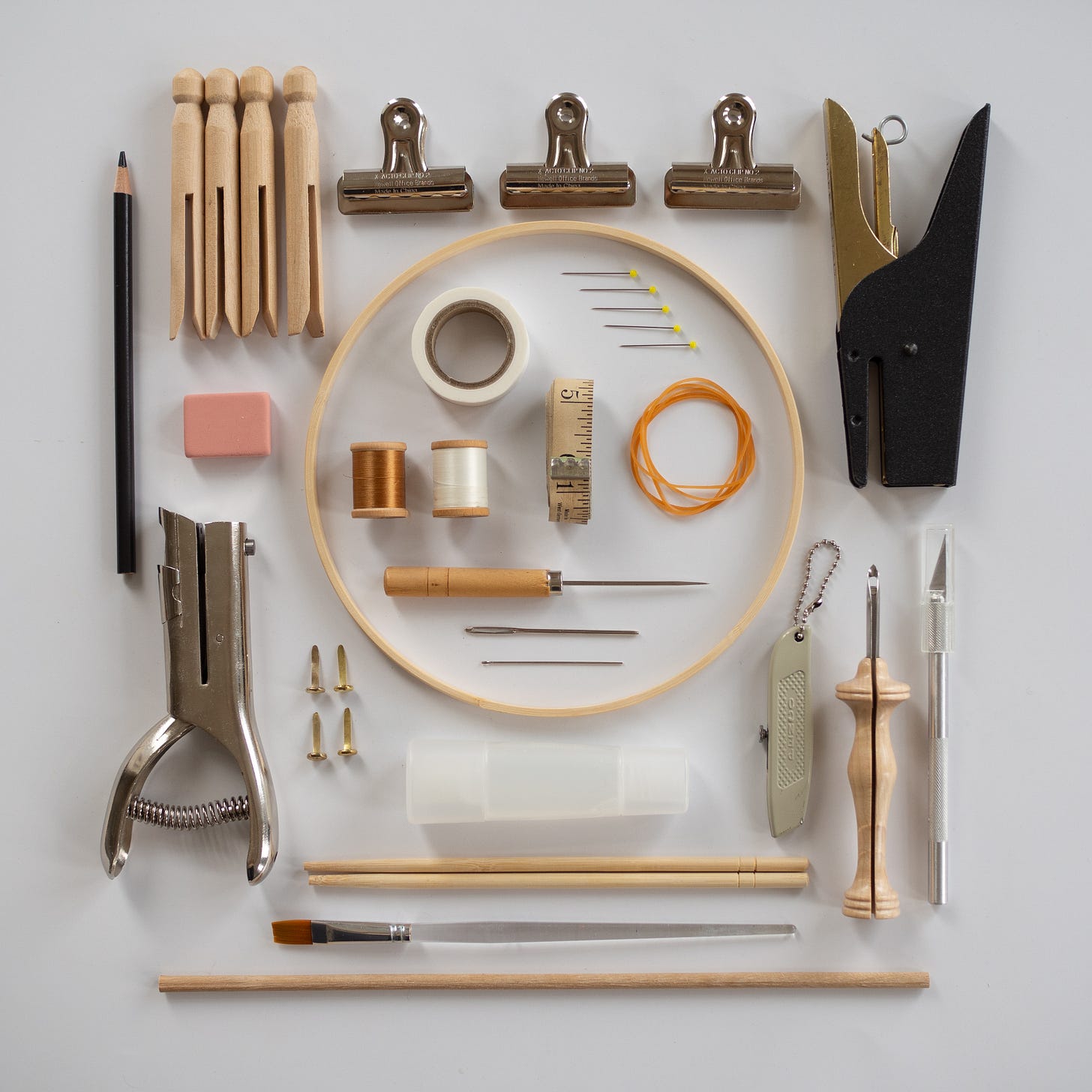redefining handy.
a Culture Study interview, inherited enthusiasm, and ongoing thoughts on the perils of perfectionism.
Hi, hello! It’s been a big week over here—I turned 40 (!) and my conversation with Anne Helen Petersen on Culture Study went live and now there are many new names and tiny avatar faces to greet me! Welcome! Today also happens to be the last day to take advantage of the $40 for 40 birthday sale that I offered on paid subscriptions this week. If you’ve been meaning to upgrade to a paid subscription (or if you want to try out a month for $4 and see how you like it), now’s the time to try. I’d be so glad to have you.
Back in Brooklyn after a week at my mom and dad’s in Connecticut, I’m preoccupied with two thoughts. One: It’s extremely hot in this infernal city come July. Two: Everything I know I learned from my parents.
The latter isn’t precisely true, but spending any extended period of time with my mom and dad highlights the particular hereditary and/or learned obsession interest in what academics might call material intelligence and what you or I might simply call, stuff and how to try to know things about it. (It also highlights where I get my aversion to people standing too close behind me and my animal instinct to remove ugly labels from jars, but that’s neither here nor there.)
In the hours before catching our train home, while James studiously deflated the four inner tubes that I had required requested for my fortieth birthday, my dad rifled around in his workshop for the proper tool to more efficiently rid them of their air. He finally landed on a pair of needle-nose pliers to do the job of unthreading the very tiny valve that would allow for easier airflow, and he wasn’t just satisfied, but downright elated. He shared this elation, and a glimpse at the tiny pin that he managed to remove, with James, and me, and my mom, and with whichever utterly disinterested grandchild happened to bound by him on the porch.
The day before, he had fixed the wheel on an old Radio Flyer wagon that my mom, as she’s wont to do, had once upon a time repainted in blue to match the house. Once the wagon wheel mission was accomplished, he made sure that every member of the family had the opportunity to admire his handiwork. Driven in part by curiosity, in part by stubbornness, and in part by good old Yankee thrift, my dad committed himself to the projects until he was sufficiently—which is to say, entirely—pleased with the results.
His fix wasn’t what you might call aesthetically perfect. Some might even call it ugly. He didn’t buy a new part or solder anything together. He didn’t draw up a schematic or reengineer the whole thing. He tinkered around in his stash of coffee-can organizer bins until he found parts that could work and then he took something that was broken and made it work again. (My mom, somewhat less inclined to regale passersby with her fix-it accomplishments was nonetheless mending a torn blanket inside while all of this wheel-fixing and tire deflating transpired outside. Apples simply don’t fall far.)
I’m not sure how to bottle up my parents’, or my own, enthusiasm for our decidedly imperfect projects, but I tend to think that the secret lies in part in a blind faith in ourselves and in part in a dogged commitment to just giving things a shot. My dad is not always successful in his fix-it schemes. My projects often don’t pan out the way I hope they will (to wit: my extremely egregious fail of a woven beach bag earlier this spring). But when we repeatedly, stupidly, consistently try, eventually something clicks—and the satisfaction and gratification when that happens is a high we can’t help but keep chasing.
If you have the time, I hope you’ll check out the full Culture Study interview about MAKING THINGS. It’s so rare that an interview allows me to talk about all of the exact things I really want to talk about, but somehow in this one, I got to do just that.




I have long returned over and over to this passage from the book The Corrections, and I want to share it here. It is about the patriarch and his “fixing,” and I love it so much.
"It offended his sense of proportion and economy to throw away a ninety-percent serviceable string of lights. It offended his sense of himself, because he was an individual from an age of individuals, and a string of lights was, like him, an individual thing. No matter how little the thing had cost, to throw it away was to deny its value and, by extension, the value of individuals generally: to willfully designate as trash an object that you knew wasn't trash.”
I think of this often in my own life. There is power and dignify in fixing things, in improving things, even just in trying.
You inspired me to get my 2 year old’s Velcro sneakers repaired instead of replacing them altogether (which I was admittedly excited to do). Because the sneakers were fine except for the strap he ripped off. And getting then repaired took about 5 mins and felt so good. Stretch goal would be to try to fix it myself, but small steps. Small wins. :) happy birthday!